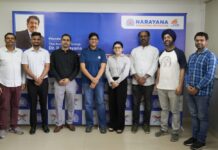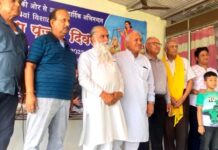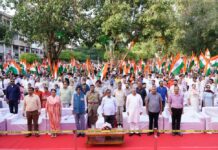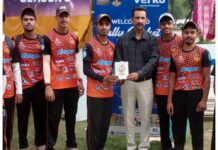Dr. Mansukh Mandaviya Inaugurates International Seminar on “Formalization and Social Security Coverage for Workers in the Informal Sector: Challenges and Innovations”
India’s Social Protection Coverage Doubled from 24.4% to 48.8%, Says Union Minister Dr. Mansukh Mandaviya
65% of Population in India Covered by at-least One Social Protection Benefit by Schemes of Central Government: Dr. Mandaviya
Union Minister Announces Plans to Extend Social Security to Gig Workers
ISSA President Dr. Mohammed Azman Applauds India’s Social Security Advancements and Innovation
Sessions Discuss Strategies to Overcome Challenges in Providing Social Security for Informal Workers
Day 1 of Seminar Concludes with a Celebration of India’s Cultural Heritage Through Vibrant Cultural Program
Union Minister of Labour & Employment and Youth Affairs & Sports, Dr. Mansukh Mandaviya inaugurated a two-day international seminar on “Formalization and Social Security Coverage for Workers in the Informal Sector: Challenges and Innovations” in New Delhi today. Union Minister of State for Labour & Employment, Sushri Shobha Karandlaje, Secretary (Labour & Employment), Ms. Sumita Dawra, ISSA President, Dr. Mohammed Azman along with other dignitaries graced the inaugural session of this technical seminar.
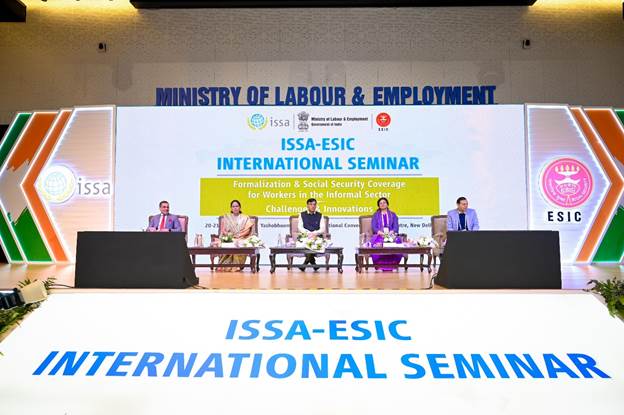
Addressing the gathering, Dr. Mandaviya highlighted the significance of the two-day seminar, stressing that social security must reach ordinary people to ensure they can live with their basic needs adequately met. He highlighted that the concept of social security dates back to ancient times and remains a continuous process. Quoting the great philosopher Chanakya, Dr. Mandaviya emphasized that people living below the poverty line, particularly those from the lowest strata of society, should be entitled to all the benefits and ease of living. He further stressed that even self-employed individuals should also be provided with social security measures.
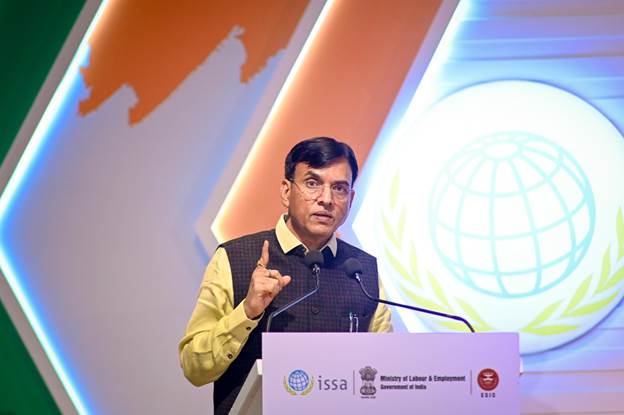
Dr. Mandaviya pointed out that, given India’s size and demographic diversity, no other country has done as much as India in the past decade to improve social security for its citizens. He mentioned that “India’s social protection coverage doubled from 24.4% to 48.8% as per ILO’s World Social Protection Report 2024-26. Almost 920 million people, 65% of population, are covered by at-least one social protection benefit (cash or in-kind) by schemes of Central Government. Average social protection coverage of the world increased by 5% points due to India’s substantial progress in enhancing the social protection coverage”. India has made significant strides in areas such as health security, pension security, livelihood security, and food security, ensuring comprehensive support for its people.
Dr. Mandaviya shared specific achievements, such as the fact that 600 million Indians are now covered under health security, with a free health cover of up to ₹5 lakh available at more than 24,000 hospitals across the country. He also mentioned that 800 million people benefit from free food grain distribution ensuring food security. The launch of the eShram portal has been another key initiative, enabling more than 300 million informal workers to register and access social security benefits, he added. In the last 10 years, 248 million people have escaped multi-dimensional poverty due to these social security measures, he mentioned.
Union Minister also highlighted India’s impressive economic growth, with a 6.7% GDP growth and a workforce of 643 million people. Women’s participation in the workforce has risen from 23.3% to 41.7% in the last 6 years, he added. Dr. Mandaviya also addressed the emerging gig economy, announcing that the new labour code has defined gig workers, and that efforts are being made to bring them under the umbrella of social security.
Union Minister of State for Labour & Employment, Sushri Shobha Karandlaje, also addressed the gathering, emphasizing the significance of the seminar, calling it the need of the hour. She highlighted that this international event marks an important milestone in advancing social protection for informal workers. Sushri Karandlaje reiterated the government’s strong commitment to promoting and protecting workers’ rights, ensuring they are shielded from discrimination and exploitation, and provided with equal economic and social opportunities. She pointed out that this vision is in line with the clear direction set by Prime Minister Modi, who acknowledges the crucial role of informal sector workers in nation-building, referring to them as partners in achieving a “Viksit Bharat” (developed India). She further stressed that it is essential for both the government and social security institutions to innovate and collaborate in creating solutions that effectively address the gaps in social protection for workers.
Secretary (Labour & Employment), Ms. Sumita Dawra highlighted India’s commitment to providing adequate social protection and generating quality jobs. She emphasized the importance of harnessing the demographic dividend, noting that over 65% of India’s population is below the age of 35 years. Ms. Dawra mentioned that to ensure social security for the formal sector, the government is strengthening services and expanding coverage for workers under the guidance of Union Minister Dr. Mansukh Mandaviya through the EPFO and ESIC. She also highlighted the government’s efforts to extend social protection to informal sector workers, pointing out the launch of several schemes, including the eShram portal, which serves as a one-stop solution providing easy access to central and state welfare schemes for over 300 million unorganized sector workers already registered on the platform.
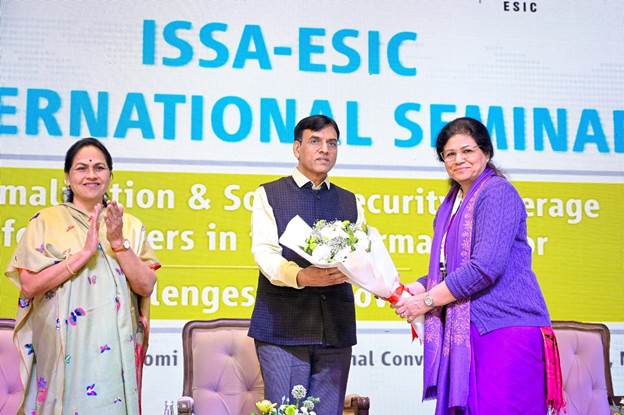
Union Minister visited various exhibition stalls showcasing initiatives like e-Shram, National Career Service portal etc. undertaken by the Ministry of Labour & Employment to strengthen the social security cover in the country at the ISSA-ESIC international seminar.
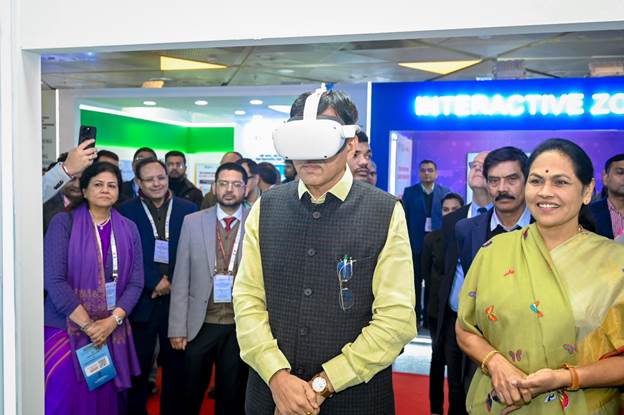
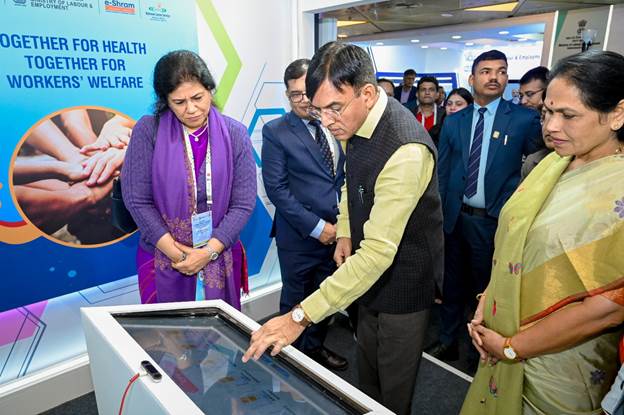
He also launched the coffee table book “Social protection in India” which highlights India’s journey in ensuring social protection for its citizens through various social welfare schemes.
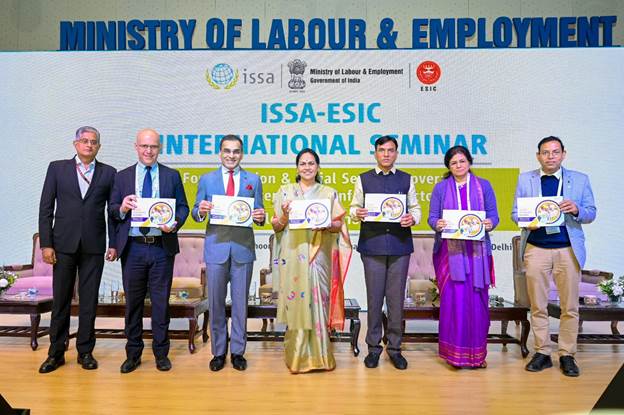
Dr. Mohammed Azman, President of the International Social Security Association (ISSA), also addressed the gathering by expressing gratitude to the Union Minister and ESIC for hosting such an important technical seminar. He commended India for its exceptional progress in strengthening its social security system, noting that the country’s hospitality and leadership in this field make it the ideal setting for this gathering. Dr. Azman acknowledged the commitment and innovation demonstrated by ESIC and EPFO in creating a more inclusive and robust social security framework. He highlighted India’s adoption of cutting-edge technologies, from biometric enrollment systems to e-governance platforms, setting a global standard in transparency and efficiency, ensuring that benefits reach those who need them most. He also praised the eShram portal, launched in 2021, as a significant step forward, further underscoring India’s commitment to the progressive universalization of social security coverage through the Social Security Code 2020.
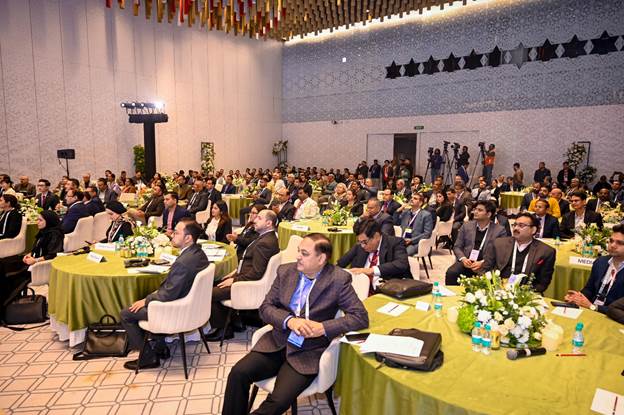
Continuing the event, several deliberations were also held on extending social security coverage to promote gender equality and women empowerment, as well as on aspects of health and medical care insurance coverage. The first session, “Formalization and Social Security Coverage: Opportunities, Challenges, and Strategies,” explored labor market developments in the region and identified factors that make social security coverage for informal sector workers challenging. It also presented international strategies and comprehensive national policy approaches that provide a framework for institutional innovations.
The second session highlighted good practices and innovative examples aimed at making social security accessible to vulnerable workers and those in the informal sector. Discussions covered benefit design, financing, simplified documentation, registration, contribution collection processes, and other measures to enhance flexibility, making social security more accessible to these difficult-to-cover groups.
The third and last session for the day focused on driving social security coverage, emphasizing that making it relevant and easy is not enough. Incentives, such as contribution subsidies, family member coverage, and measures to help small enterprises register employees, are crucial for reaching difficult-to-cover groups.
The event concluded with a vibrant cultural program that showcased the rich diversity and heritage of India.
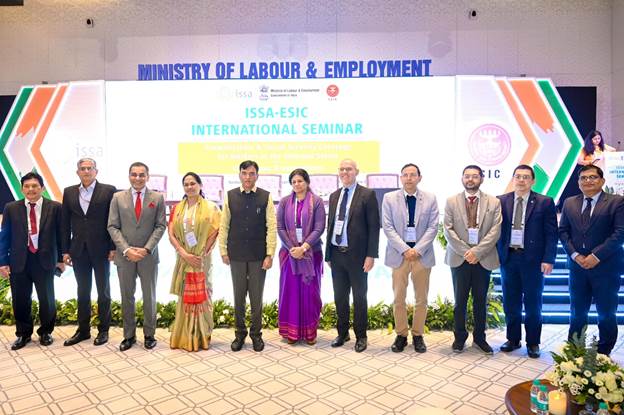
Background:
This international dialogue was organized by the Ministry of Labour and Employment of India, in collaboration with the Employees’ State Insurance Corporation (ESIC) and International Social Security Association (ISSA) at the Yashobhoomi – India International Convention and Expo Center.
The technical seminar aims to bring together over 150 stakeholders, including policymakers, social security administrators, and experts from Asia-Pacific countries, to discuss strategies for formalizing informal sector workers and expanding social security coverage. Senior experts from renowned international organizations such as the World Bank, United Nations, and ILO are contributing their insights during the seminar. The primary goal is to strengthen stakeholders’ capacity to extend social protection to informal sector workers, with focused discussions on formalization, incentives, digital solutions, and outreach strategies. India’s landmark initiatives, such as the e-Shram portal, National Career Service portal, and Labour Reforms, are being highlighted, along with the progress made by ESIC and EPFO in advancing social security for formal workers.
******


